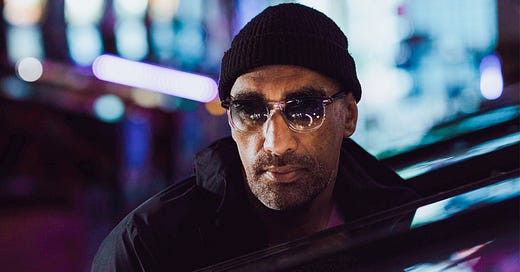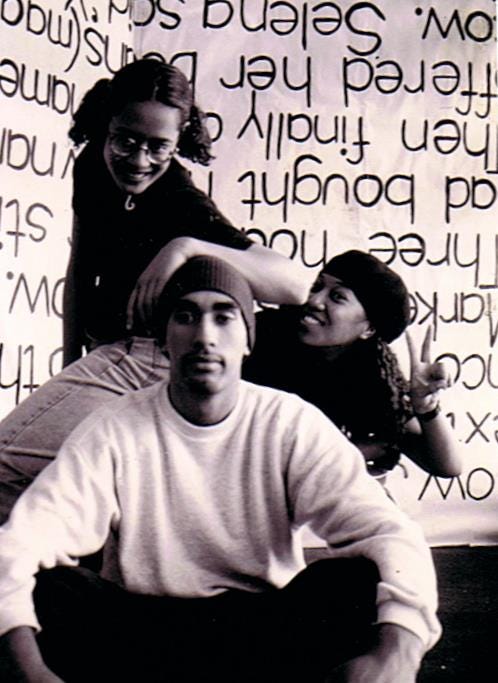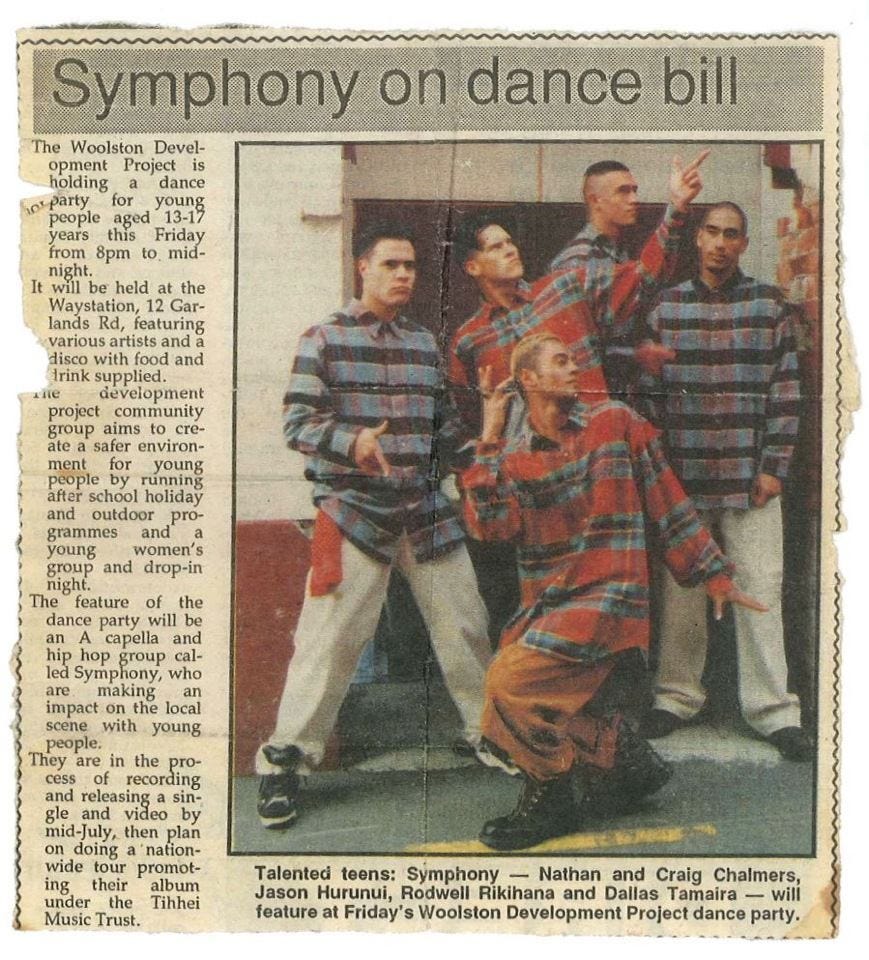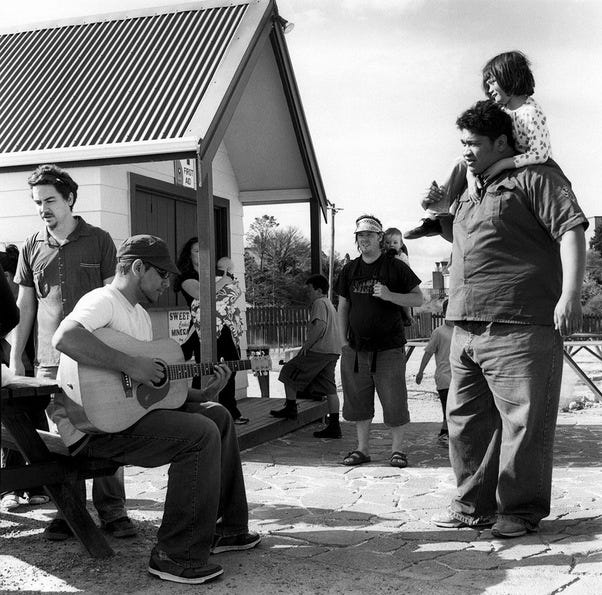The Sunday Feature: Dallas Tamaira
Talking modern New Zealand music history and solo music with the voice of Fat Freddy's Drop.
Selected Works is a regular newsletter by the Te Whanganui-a-Tara, Aotearoa (Wellington, New Zealand) based freelance music journalist, broadcaster, copywriter, and sometimes DJ Martyn Pepperell. Yes, that’s me. Most weeks, Selected Works consists of a recap of what I’ve been doing lately and some of what I’ve been listening to and reading, paired with film photographs I’ve taken + some bonuses. All of that said, sometimes it takes completely different forms.
Throughout February and March of 1994, the late great Phil Fuemana - the founder of Urban Pacifika Records - led a litany of South Auckland hip-hop, RnB and new jack swing groups across New Zealand to promote the release of the classic album Proud: An Urban-Pacific Streetsoul Compilation. When the tour arrived in Christchurch (the largest city in the South Island), a then-teenage Dallas Tamaira, aka Joe Dukie, who went on to find global underground fame as the smooth soul voice of the hi-tek soul big band Fat Freddy’s Drop, was in the audience.
Thinking back twenty-nine years, Dallas remembers the experience as having a profound impact on his younger self. “That was one of my most important experiences in terms of finding brown musical role models,” he said, speaking by Zoom on a Tuesday morning. “Seeing a whole show of amazing and polished artists gave us a sense of how far we could take it. It was really affirming for us.”
Sara-Lia Tamati, Dallas Tamaira and Joy Vaele on the 1996 Pacific Underground Romeo and Tusi theatre in education tour
Credit: Photo by Mishelle Muagututi'a
Back in the mid-90s, Dallas was a teenage thespian with Christchurch’s Pacific Underground performing arts collective and the de facto leader of Symphony, an A cappella and hip-hop vocal group he shared with Nathan and Craig Chalmers, Jason Hurunui and Rodwell Rikihana. “We were messing with that Boyz II Men thing, but we had our own twist on it,” he continued. “For me, it was always about trying to write original music.”
After the show, Dallas and the rest of Symphony got talking with some of the Proud performers, most crucially Sani Sagala, aka Dei Hamo from Pacifican Descendants, who landed a number-one chart hit a decade later with his jiggy rap anthem ‘We Gon’ Ride’. “We became good friends, and he would come and stay with me when he came down to work on music with our friend Hamish [Clark],” Dallas remembered.
Hamish Clark, aka Hamey Hame, was a member of Beats’n’Pieces, one of the leading crews in Christchurch’s tightly-knit young 90s hip-hop scene. A skilled rapper, sample-based beatmaker and producer, Hamish helped inspire a generation of Christchurch talents that included Malo Luafutu, aka Scribe, one of the most successful New Zealand hip-hop artists of all time. “Back in the day, Hamish was our guru,” Dallas said.
Aside from Sani, Hamish also had links with a range of Auckland rappers, beatmakers and musicians, including Dam Native, Zane Lowe (with whom he later formed the group Breaks Co-op) and the modern jazz artist Nathan Haines. Between watching what Hamish was doing and some encouragement from Sani, Dallas and Symphony travelled up to Auckland to see if they could break into the music industry.
“The cool thing was Sani got us a look in at Deeprooves Entertainment,” Dallas enthused, pausing before chuckling. “We went to the office, performed for them in the hallway, and the boss (Kane Massey) said, ‘That sounds good. We’ll go with that.’”
Alongside the student radio station 95 bFM and the Cause Celebre/The Box nightclubs on High Street, Deepgrooves Entertainment sat near the centre of a distinctly Pacific musical melange of reggae, dub, hip-hop, ragga and club music fermenting within central Auckland. Signing with them would have located Symphony within the beating heart of the underground. However, as the rest of the group moved towards conventional RnB, Dallas yearned for something more stripped-down, soulful and hip-hop-influenced. “I felt like I’d done all I needed to do with that band, and then I left them to it,” he explained.
In the late 1990s, Dallas moved to the North Island and settled in Wellington, where he became friends with Chris Faiumu, aka DJ Mu, who was well-known around town as a member of the Roots Foundation DJ collective. As well as DJing, Mu had a passion for beat-making with an Akai MPC sampler, audio engineering, and production, all expressed through his membership alongside Dallas in the dub-funk jam band Bongmaster, which helped lay the foundations for Fat Freddy’s Drop.
Back then, Dallas used to perform with his back facing the audience, which, ostensibly speaking, sounds like a sign of shyness. When we talked about it, he laughed before making a point that illustrates how improvisational the Bongmaster gigs were. “It was functional, bro,” he said. “I was looking at the band because I needed to. I needed to know what they were doing. I needed to look for the signs. I didn’t have any lyrics written down. It can go really wrong, but the times it went right were amazing.”
“We had this whole thing of jamming, then coming back later and listening to our jams,” Dallas continued. “It’s about letting whatever wants to come through come through. Listening out for those words and not being too judgmental.”
Originally, the Freddys emerged from Mu DJing at inner city lounge bars like The Matterhorn with Dallas and trumpeter Toby Laing improvising on top of his mixes. Over the next few years, the band’s membership swelled. During these early days, Mu and friends, including DJ Raw from the Wellington hip-hop group The Footsouljahs, helped Dallas record and release a four-song EP called Better Than Change (1999). On the title track, he sang forlornly, exploring the afterglow of a lost love over warm, laidback drums and sunkissed guitars. It might have been the beginning of a longstanding solo career if things had gone differently.
However, off the back of a series of memorable appearances at outdoor summer festivals like Whopper Chopper, Alpine Unity, Radio Active 88.6 FM’s One Love Waitangi Day concert, and their cult Live at the Matterhorn live CD, Dallas and the rest of the Freddys were thrust into a trajectory that saw them beginning to travel overseas to Australia and Europe, along the way recording classic 12” vinyl singles such as ‘Midnight Marauders’, ‘Hope’ and ‘This Room.’ With these records, the band found a stylistic throughline between soul, reggae, dub techno and house while winning over a generation of DJs and broadcasters throughout the global underground.
At home in New Zealand, one of their early crucial supporters outside of Wellington was Mark Williams, also known as Loggy Logg or MC Slave, previously known for his work as a rapper alongside Otis Frizzel in the MC OJ & The Rhythm Slave and Joint Force groups. Alongside rapping, Mark DJed and had a longstanding broadcasting association with bFM. By the early 2000s, Mark and Otis were hosting Mo' Show, a hip-hop-inspired travel show on the TV2 television channel.
Looking back, Dallas remembered Mark and Otis interviewing Freddy’s for Mo’ Show before they performed alongside fellow Wellington groups Trinity Roots and the vocal house trio Ebb at an infamous nightclub in Amsterdam, Melkweg. “That was our connection to Mark,” Dallas said. “When we had ‘Midnight Marauders’ out, Mark started playing it and got it out to the people. He’s always been one of our champions, our word of mouth.” Over the following years, Mark went from championing the Freddys through his radio shows and DJ sets to joining them on stage as an MC and recording with the group.
They had another advocate in the American electronic music producer, DJ and musician Matthew Chicoine, aka Recloose. Hailing from Detroit, Michigan, Recloose spent the 2000s and early 2010s living in New Zealand while touring the world and releasing music through labels like Peacefrog Records, Sonar Kollektiv, Rush Hour, and LOOP.
Sonar Kollectiv is crucial here because, as Dallas remembered it, “He (Recloose) took ‘Midnight Marauders’ to Berlin and played it to the cats from Sonar Kollectiv, which opened the door for us to go over there and meet them.” In Germany, Freddy’s found common ground with the Sonar Kollectiv label Best Seven, who re-released ‘Midnight Mauraders’ in Europe and issued several other singles for the group. “Best Seven and Sonar Kollectiv just know so many people, bro,” Dallas said. “They had this whole other world of independent artists.”
Fat Freddy's Drop, 2005
Credit: Photo by Ans Westra
As the Freddys made their way towards the 2005 release of their era-marking debut album, Based on a True Story, Dallas began to collaborate with music makers from the extended Sonar Kollectiv friends and family universe, including Eva Be, Boozoo Bajou, Recloose, Close and The Next Men, often recording under his alias Joe Dukie. “My kaupapa was to do as much as I could, “ Dallas explained. “At that time of my life, I just thought I had to do everything. Some artists just stick to their lane, but I wanted to spread the good word and get my voice out there as much as I could.”
While he was deepening his musical connections in Europe, Dallas was doing the same back home. When the Freddys went to Australia to play some shows with fellow New Zealand groups Salmonella Dub and Shapeshifter, he struck up a friendship with then-Shapeshifter member Devin Abrams aka Reno. During the tour, they spent some time recording together in Melbourne and came up with one of Shapeshifter's early signature songs, 'Long White Cloud'. “That track was funny because I freestyled that whole thing, then Reno chopped it up later,” Dallas remembered. “He’s such a cool cat. He was actually crying real tears in the [studio] session. We connected over ‘Long White Cloud’, really.”
Over the next two decades, the Freddys bubbled up to unprecedented levels in New Zealand and Australia before going on to perform to huge audiences at festivals, concert halls and theatres across Europe. Amidst their ongoing roadshow and marathon studio sessions, Dallas kept wondering what it would be like to record more of his own solo material. “I know for a fact that there are things I stay away from with Freddys,” he said. “With Freddys, I feel like I really am the voice, so what I sing about needs to be relevant for everyone in the band.”
Sometimes, when he was thinking about the itch he first scratched in 1999 with the Better Than Change EP, he would talk to Reno about it, generally after they played basketball games together. ‘He’s always been really encouraging,” Dallas said. “Whenever I see him, he always cuts it to the bone. ‘C’mon Dukie, what are you doing? Don’t be lazy!’”
In the late 2010s, Reno retired from his membership in Shapeshifter and went on his own personal voyage of musical discovery with Pacific Heights, a multi-genre solo project he first put together in Christchurch in the early 2000s. By 2008, his crisp Artcore jungle/drum’n’bass productions had given way to smooth downtempo instrumentals, neo-soul, cinematic beats and melodic hip-hop. That year, when he released his debut album In A Quiet Storm, he was sure to feature Dallas as a vocalist on his horn-led modern soul cut ‘Peace’. In the decade and a half since, Dallas has continued to feature on Reno’s projects.
In 2020, during the depths of the global pandemic, Dallas flipped the script and asked Reno if he would produce some of his own music for him. Beginning with the 70s slanted soul-folk track ‘No Flowers’, they entered into a deeper musical relationship that paved the way for Dallas’ forthcoming new six-song solo EP, Levels, scheduled for release on the 3rd of November this year through a licensing deal with Sony Music New Zealand.
Produced by Reno and mixed by Mu from Freddys, Levels sees him singing with a cast of friends and collaborators drawn from Dallas’s various communities throughout New Zealand. Foreshadowed by his recent dubby Ethio-jazz tinged singalong, 'Stormy', the EP showcases a different side of Dallas, which, as he put it, "[is about escapism, creating and exploring new worlds and spaces, and navigating and strengthening bonds along the way."
By stepping outside his comfort zone with the Freddys, he’s been able to shift his point of view and the stories he chooses to tell while musically reinvigorating himself. “For my own stuff, I see much more of a focus on personal writing and relationships,” he said. “Artists need to write about what they see and feel. At least, that’s what I’m trying to do with this stuff, writing about what I see and feel rather than writing to an audience or for other people.”
You can pre-order the vinyl EP edition of Levels through Flying Out now (over here) or check out his existing singles through Spotify or Bandcamp (here) and (here).







